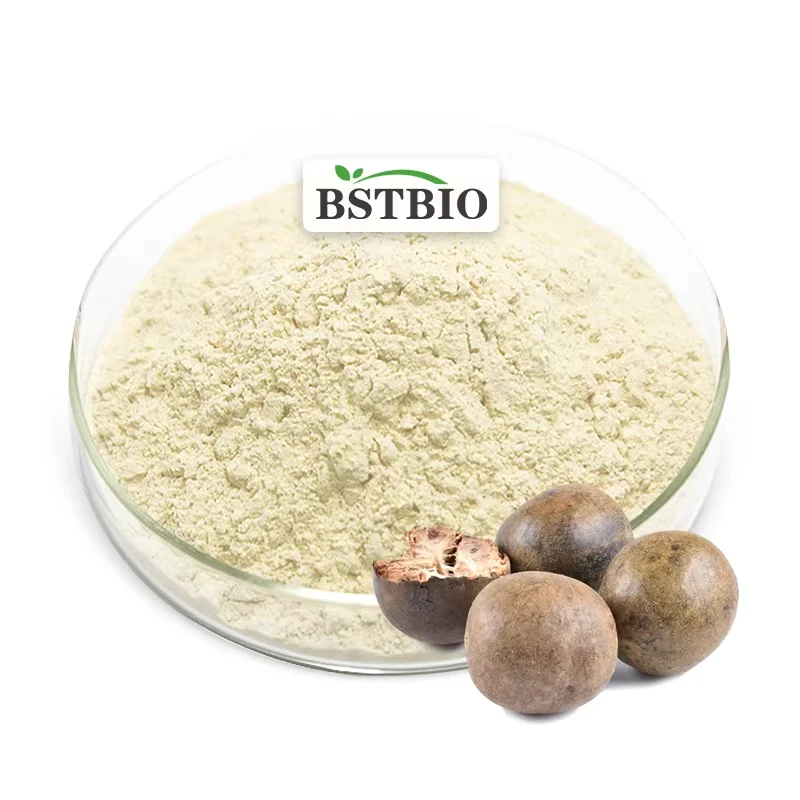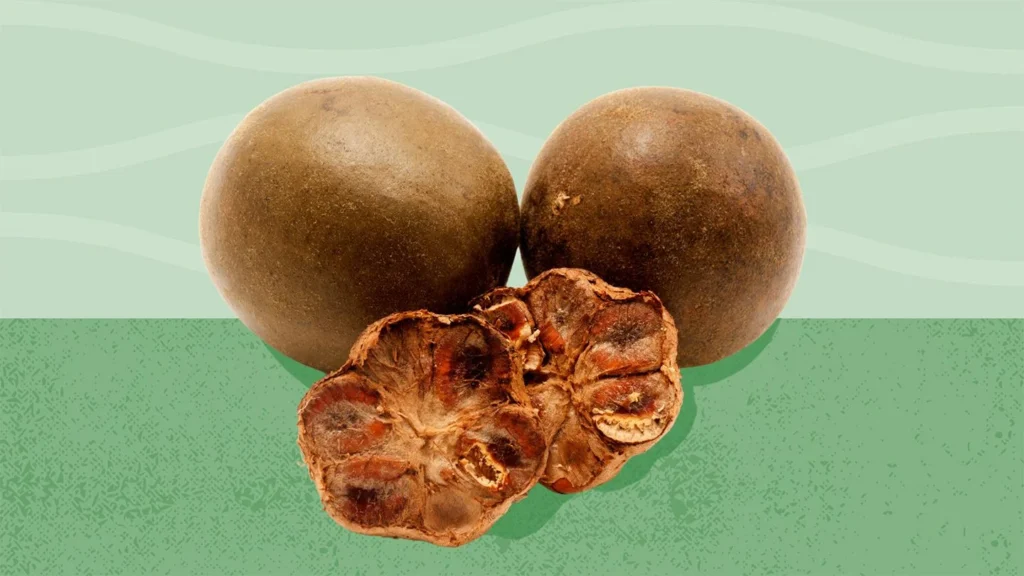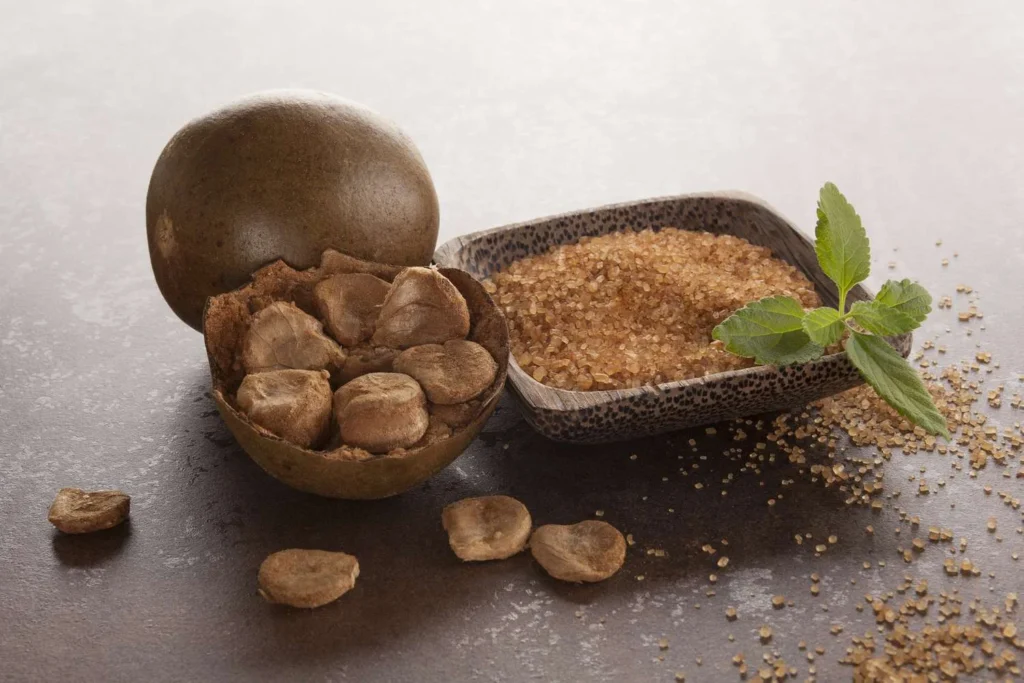В мире, где все стараются сократить потребление сахара, поиск идеального заменителя может показаться бесконечным. Вам нужно что-то приятное на вкус, натуральное и не имеющее целого списка тревожных побочных эффектов. Заходите на сайт . экстракт плодов монахаПодсластитель, который стремительно набирает популярность, поскольку обладает всеми необходимыми свойствами.
Но что же это такое? Действительно ли он полезен для здоровья? И как он сочетается с другими вариантами, например, со стевией? Как дипломированный диетолог и специалист по пищевым продуктам, я постоянно получаю эти вопросы от клиентов. В этом руководстве вы найдете четкие, научно обоснованные ответы на все, что вам нужно знать об экстракте плодов монки.
Что такое экстракт плодов монаха?
От древней китайской медицины до вашего кухонного стола
Плоды монахинь, также известные как луо хань гуо или Siraitia grosvenoriiНебольшая круглая зеленая дыня родом из Южного Китая. На протяжении многих веков она используется в традиционной китайской медицине как средство от кашля и боли в горле. Ее название происходит от имени буддийских монахов, которые одними из первых начали выращивать этот фрукт много веков назад.
Хотя сам фрукт не является чем-то новым, его использование в качестве коммерческого подсластителя - относительно современная инновация.
Как его производят? Объяснение процесса добычи могрозида V
В отличие от сахара, сладость монадного фрукта обусловлена не его натуральными сахарами (такими как фруктоза и глюкоза). Вместо этого ее источником являются мощные антиоксидантные соединения, называемые могрозиды.
С точки зрения пищевой науки, процесс экстрагирования довольно мудреный:
- Свежие плоды собирают, удаляют семена и кожуру.
- Мякоть фрукта измельчают и смешивают с горячей водой, получая сладкий настой.
- Затем этот настой процеживается, и остается концентрированная жидкость, богатая могрозидами. Самым богатым и сладким из них является Могрозид VОн может быть в 250-300 раз слаще обычного столового сахара.
Благодаря этому процессу конечный продукт содержит ноль калорий и ноль сахара, только чистые, сладкие на вкус соединения.
7 научно обоснованных преимуществ экстракта плодов монаха
Плоды монки - это не просто сладость. Вот некоторые из его наиболее значимых, подтвержденных фактами преимуществ.
1. Ноль калорий, ноль углеводов Поскольку организм не метаболизирует могрозиды так же, как сахар, вы получаете всю сладость без калорий и углеводов. Это делает его исключительным средством для контроля веса.
2. Не повышает уровень сахара в крови Экстракт плодов монаха имеет нулевой гликемический индекс (ГИ). Это означает, что он не вызывает скачков уровня глюкозы или инсулина в крови, что делает его отличным и безопасным заменителем сахара для людей с диабетом. По моему клиническому опыту, это один из самых надежных сахарозаменителей для клиентов, которым необходимо тщательно контролировать уровень сахара в крови.
3. Содержит антиоксидантные свойства Могрозиды, обеспечивающие сладость, также обладают антиоксидантным действием. Антиоксиданты помогают организму бороться со свободными радикалами - нестабильными молекулами, которые могут вызывать повреждение клеток и способствовать развитию хронических заболеваний. [Источник: исследование 2013 года в Бразильском журнале медицинских и биологических исследований].
4. Может оказывать противовоспалительное действие Первые исследования показывают, что могрозиды могут проявлять противовоспалительные свойства, что может помочь уменьшить воспаление в организме. Несмотря на необходимость проведения дополнительных исследований на людях, это многообещающая область исследований.
5. Способствует здоровью зубов (не вызывает кариеса) В отличие от сахара, плоды монке не питают вредные бактерии во рту, которые приводят к кариесу и разрушению зубов. Переход на подслащивание фруктом монка может стать положительным шагом для гигиены полости рта.
6. Высокая универсальность и термостабильность Монахов фрукт устойчив к высоким температурам, а значит, его можно использовать для выпечки и приготовления пищи, и он не потеряет своей сладости. Это дает ему большое преимущество перед некоторыми искусственными подсластителями, которые могут разрушаться при нагревании.
7. Не содержит вредных добавок (в чистом виде) Чистый экстракт плодов монаха не содержит противоречивых ингредиентов, содержащихся в некоторых искусственных подсластителях, таких как аспартам. Примечание: Всегда проверяйте этикетку, так как некоторые имеющиеся в продаже подсластители из плодов монах-фрукта смешиваются с другими ингредиентами, например с эритритолом.
Есть ли побочные эффекты? Взгляд на безопасность плодов монаха
Это один из самых распространенных вопросов, которые я получаю. Хорошая новость заключается в том, что экстракт плодов монки в подавляющем большинстве случаев безопасен для употребления.
- Одобрено Управлением по контролю за продуктами и лекарствами США: Управление по санитарному надзору за качеством пищевых продуктов и медикаментов США (FDA) признало очищенный экстракт плодов монаха Общепризнанная безопасность (GRAS) для всех, включая беременных женщин и детей.
[Источник: FDA GRAS Notices] - Аллергические реакции: Аллергические реакции встречаются крайне редко. Однако если у вас есть аллергия на другие фрукты семейства тыквенных (например, тыкву, кабачок или дыню), вам следует соблюдать осторожность.
- Проблемы с пищеварением: Известно, что чистый экстракт плодов монке не вызывает вздутия живота или газообразования. Когда люди испытывают расстройство пищеварения, это часто связано с другими сахарными спиртами (например, эритритом), которые иногда смешивают с экстрактом монк-фрукта, чтобы добавить объем и текстуру.
Монаховые плоды против других подсластителей: Сравнение "с ног на голову
Как монах-фрукт конкурирует с другими популярными сахарозаменителями? Вот краткая характеристика.
| Характеристика | Экстракт плодов монаха | Стевия | Эритрит |
|---|---|---|---|
| Сладость | 150-300x Сахар | 200-350x Сахар | ~70% сахара |
| Калории | 0 | 0 | ~0,2 на грамм |
| Послевкусие | Минимальный, иногда фруктовый | Может горчить, напоминать солодку | Легкое ощущение охлаждения |
| Гликемический индекс | 0 | 0 | 0 |
| Лучшее для | Кофе, чай, соусы, выпечка | Напитки, жидкие приложения | Выпечка, обеспечение сыпучими продуктами |
- Монаховые плоды против стевии: Оба являются натуральными, не содержащими калорий подсластителями. Основное различие заключается во вкусе. Многие люди, которым стевия кажется слегка горьковатой или лакричной на вкус, предпочитают более чистый и мягкий профиль плодов монах-фрукта.
- Монаховые плоды против эритрита: Эритрит - это сахарный спирт, который менее сладок, чем сахар, и часто используется для придания сыпучести выпечке. Несмотря на свою безопасность, он может вызывать ощущение "охлаждения" во рту, а у некоторых людей при употреблении в больших количествах может привести к расстройству пищеварения. Плоды монки намного слаще и реже вызывают расстройство пищеварения.
- Монаховые плоды против аспартама: Ключевое различие - натуральное и искусственное. Монахов плод - это экстракт растительного происхождения, а аспартам - синтетическое химическое вещество. Для тех, кто ищет натуральную альтернативу с чистой этикеткой, плоды монаха - несомненный победитель.
Как использовать экстракт плодов монаха в повседневной жизни
Включить монах-фрукт в свой рацион очень просто. Он доступен в виде жидкости, гранул и порошка.
- Идеально подходит для кето-, палео- и диабетической диет: Поскольку в нем нет углеводов и сахара, он полностью соответствует диетическому образу жизни.
- Советы по выпечке и приготовлению пищи: Хотя он и придает сладость, но не обеспечивает подрумянивание или структуру, как сахар. Для рецептов, где важна текстура (например, для печенья), я считаю, что смесь монк-фрукта и эритритола часто дает наилучшие результаты.
- Лучший способ подсластить кофе или чай: Достаточно нескольких капель жидкого экстракта плодов монаха или маленькой ложечки порошка. Он легко растворяется как в горячих, так и в холодных жидкостях, не оставляя зернистой текстуры.
ВОПРОСЫ И ОТВЕТЫ: Ответы на ваши главные вопросы о плодах монаха
Имеет ли экстракт плодов монки странное послевкусие?
Большинство людей считают, что у него очень чистый, сладкий вкус, практически без послевкусия. Некоторые описывают очень тонкую фруктовую ноту, которая гораздо менее выражена, чем послевкусие, связанное со стевией.
Нарушает ли экстракт плодов монаха пост?
Поскольку он не содержит калорий и не вызывает инсулиновой реакции, чистый экстракт плодов монаха считается безопасным для употребления во время поста, не нарушая его.
Какая марка экстракта плодов монки является лучшей?
Ищите марки, в которых в качестве единственного ингредиента указан "экстракт фрукта монка" или "могрозиды". Если вы выбираете смесь, убедитесь, что вы знаете, какие еще подсластители (например, эритрит) входят в ее состав. Среди популярных и авторитетных брендов - Lakanto, NOW Foods и Pure Monk.
Итог: Подходит ли вам экстракт плодов монаха?
Для тех, кто хочет снизить потребление сахара, не прибегая к искусственным химикатам и не жертвуя вкусом, экстракт плодов монки - один из лучших вариантов на сегодняшний день. Это безопасный, натуральный и универсальный подсластитель с дополнительными преимуществами: он не содержит калорий и не влияет на уровень сахара в крови.
Если вы лечите диабет, придерживаетесь кето-диеты или просто делаете более здоровый выбор для себя и своей семьи, экстракт плодов монаха - надежное и эффективное средство, которое обязательно должно быть в вашей кладовой.



